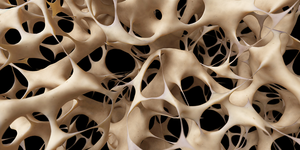Chinese pharmaceutical company, Qilu Pharmaceutical (Qilu) is carrying out a phase III clinical trial for a copy biological of Amgen’s Prolia/Xgeva (denosumab).
Qilu starts phase III trial for denosumab copy biological
Biosimilars/News
|
Posted 22/11/2019
 0
Post your comment
0
Post your comment

Denosumab is a humanized monoclonal antibody that is an inhibitor of the receptor activator of nuclear factor kappa-B ligand (RANKL), which works by preventing the development of osteoclasts which are cells that break down bone. It is used for the treatment of osteoporosis, treatment-induced bone loss, metastases to bone and giant cell tumour of bone.
The originator biological, osteoporosis treatment Amgen’s Prolia/Xgeva (denosumab), had estimated global sales of approximately US$4 billion in 2018. The patents on Prolia/Xgeva will expire in the US on 19 February 2025 and will expire in Europe on 25 June 2022, except for France, Italy, Spain and the UK, where they will expire in 2025 [1].
The randomized, double-blind, two-group parallel, placebo-controlled, multicentre phase III clinical trial is being carried out in China. The study will compare the efficacy and safety of QL1206 versus placebo in the treatment of post-menopausal osteoporosis in women with high fracture risk.
Qilu intends to enrol 216 patients in one of two cohorts. Subjects will receive a single 60 mg injection of QL1206 or placebo every 6 months for 1 year, i.e. two subcutaneous injections. In addition, the subjects will take 500 mg of calcium and 1,000 IU of vitamin D daily.
The primary objective of the study is to evaluate the effect of QL1206 treatment compared with placebo. The secondary objective is to evaluate the clinical safety, immunogenicity and pharmacokinetic (PK) characteristics of QL1206. In addition, the study also has an exploratory purpose to evaluate the effect of anti-drug antibodies (ADA) on the characteristics of QL1206 PK and the relationship between QL1206 exposure and pharmacodynamic (PD) endpoints, efficacy and adverse events.
The trial is planned to be completed in July 2021.
Qilu has also already carried out a phase I trial with QL1206 which compared the PK, safety and PD of QL1206 and Xgeva in 168 healthy adults. This phase I trial was completed in May 2019.
Editor’s comment
It should be noted that copy biologicals approved in China might not have been authorized following as strict a regulatory process as is required for approval of biosimilars in the European Union. The EMA (European Medicines Agency) regulatory requirements ensure the same high standards of quality, safety and efficacy for biosimilars as for originator biologicals, and also include a rigorous comparability exercise with the reference product.
Related articles
Biosimilars of denosumab
Generic lung cancer treatment now available in China
Reference
1. Derbyshire M. Patent expiry dates for biologicals: 2018 update. Generics and Biosimilars Initiative Journal (GaBI Journal). 2019;8(1):24-31. doi:10.5639/gabij.2019.0801.003
Permission granted to reproduce for personal and non-commercial use only. All other reproduction, copy or reprinting of all or part of any ‘Content’ found on this website is strictly prohibited without the prior consent of the publisher. Contact the publisher to obtain permission before redistributing.
Copyright – Unless otherwise stated all contents of this website are © 2019 Pro Pharma Communications International. All Rights Reserved.
Source: ClinicalTrials.gov, Qilu
Research
Reaching ESG goals in pharmaceutical development
What is the future for the US biosimilar interchangeability designation
General
Samsung Bioepis wins Pyzchiva case; Regeneron patent rulings threaten foreign biosimilars
Chinese biosimilars go global: growth, partnerships, and challenges
Most viewed articles
The best selling biotechnology drugs of 2008: the next biosimilars targets
Global biosimilars guideline development – EGA’s perspective
Related content
FDA approves Poherdy (first interchangeable pertuzumab) and Armlupeg (pegfilgrastim) biosimilars
EMA recommends approval for insulin glargine biosimilar Ondibta and denosumab biosimilar Osqay
FDA approves denosumab biosimilars Osvyrti and Jubereq, Boncresa and Oziltus
FDA approves aflibercept biosimilar Eydenzelt and label expansion for adalimumab biosimilar Yuflyma
FDA approves Poherdy (first interchangeable pertuzumab) and Armlupeg (pegfilgrastim) biosimilars

Biosimilars/News Posted 27/01/2026
EMA recommends approval for insulin glargine biosimilar Ondibta and denosumab biosimilar Osqay

Biosimilars/News Posted 16/01/2026
FDA approves denosumab biosimilars Osvyrti and Jubereq, Boncresa and Oziltus

Biosimilars/News Posted 07/01/2026
FDA approves aflibercept biosimilar Eydenzelt and label expansion for adalimumab biosimilar Yuflyma

Biosimilars/News Posted 05/12/2025
The best selling biotechnology drugs of 2008: the next biosimilars targets






Post your comment